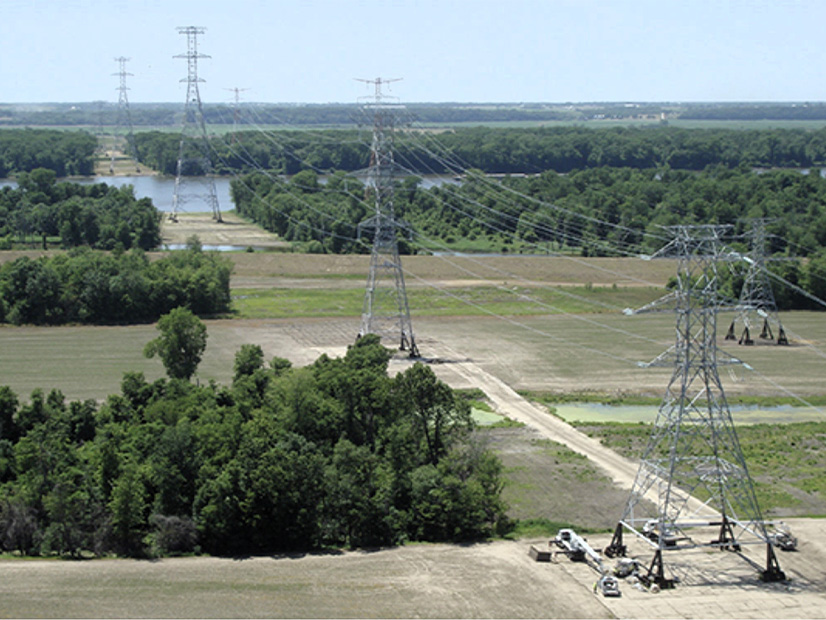Illinois Gov. J.B. Pritzker (D) on Wednesday vetoed a measure that would have allowed incumbent downstate utilities — particularly Ameren Illinois — exclusive rights to build regional MISO transmission lines.
The governor issued an amendatory veto to HB 3445, striking out the right of first refusal (ROFR) piece of the legislation and letting other portions stand, including an adjustment making on-site solar grants more available to schools, an amendment requiring the Illinois Power Agency to conduct more comprehensive policy studies and a requirement that renewable energy developers be more responsible for drainage system issues stemming from their projects.
State lawmakers have the option to let the governor’s decision stand through either acceptance or nonaction or override the veto to pass the bill in its entirety.
Pritzker’s office said the ROFR “will raise costs for rate payers by giving incumbent utility providers in the MISO region a monopoly over new transmission lines.”
“Eliminating competition will cause rates to increase in the MISO region, where there is currently over $3.6 billion in planned transmission construction in the Ameren service territory. Without competition, Ameren ratepayers will pay for these transmission projects at a much higher cost, putting corporate profits over consumers,” Pritzker said.
MISO executives have said they were monitoring developments around the measure and how it could affect competitively bid projects in its first, $10.3 billion long-range transmission plan (LRTP) portfolio. (See “ROFR Developments May Complicate LRTP Planning,” MISO Modeling Line Options for 2nd LRTP Portfolio.)
MISO has seen a flurry of ROFR law activity in its footprint since it approved the first LRTP portfolio last year. The grid operator has a goal to approve another multibillion-dollar LRTP aimed again at its Midwest region next year.
The Electricity Transmission Competition Coalition (ETCC) welcomed news of the veto, saying the ROFR would have squelched competition and stymied innovation.
“By vetoing the ROFR provision, Gov. Pritzker has powerfully stood up against utility monopoly interests and shown that he is on the side of consumers and backs lower electricity prices,” ETCC Chair Paul Cicio said in a statement. “The ROFR was anti-competitive, anti-consumer, inflationary and Illinois families and businesses would have paid higher electricity prices for decades to come.”
The ETCC said data from the U.S. Energy Information Administration ranks Illinois the 13th highest in the nation for electricity rates.
Bill sponsor Rep. Larry Walsh Jr. (D-Elwood) has vowed to file for an override and pass the bill over the governor’s opposition during the legislature’s veto session beginning in October. Walsh told Capitol News Illinois that he believes a ROFR will ensure Illinois labor unions are employed for the projects under Illinois’ worker protections. He said the bill will give the state more oversight over transmission line construction, rather than dealing with out-of-state developers.
Ameren Transmission Co. of Illinois similarly characterized the ROFR as a “labor proposal” that would “enable much-needed electric transmission capacity to be quickly and cost effectively placed into service.”
“Unfortunately, [the] veto will result in unnecessary delays in construction that increase costs for downstate energy customers and put the benefits of the clean energy transition at risk,” Shawn Schukar, president of Ameren Transmission Co. of Illinois, said in an email to RTO Insider. “To do it fast and do it right, with accountability for results, these projects should be managed by trusted local energy companies with a proven track record of success, who already competitively bid the projects with local contractors and union workers.”
Pritzker Takes New Nuclear Off the Table
Last week, Pritzker also vetoed SB76, which would have lifted Illinois’ moratorium on new nuclear reactors. The state in 1987 prohibited construction of new nuclear facilities in the absence of a permanent solution for storing nuclear waste. The bill would have allowed the development of the first small modular reactors in the state.
Pritzker said he vetoed the bill because it contained a vague and “overly broad definition of advanced reactors,” which might “open the door to the proliferation of large-scale nuclear reactors that are so costly to build that they will cause exorbitant ratepayer-funded bailouts.”
The governor also said the bill didn’t provide regulatory protections for Illinois residents who would reside and work near new reactors.
Walsh, a sponsor of that bill, again criticized the governor’s veto, saying that nuclear energy must factor into the clean energy transition. He said Illinois lost an “opportunity to allow new, safe and efficient reactors to be a tool in our energy toolbox.”


